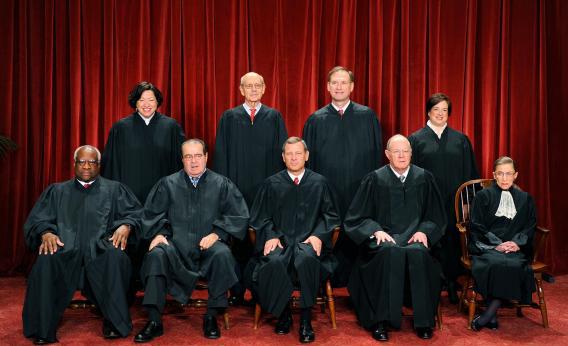America’s verbose top judges could drown out the healthcare debate if they’re not careful. The most talkative Supreme Court on record will next week hear a hefty three days of oral argument on President Barack Obama’s landmark reform. If past patterns hold, the justices will spend more time testing each other than listening to the lawyers for each side.
Supreme Court arguments typically last an hour, a 1970 rule designed to keep cases moving and ensure the justices control the debate. Exceptions are made for the biggest cases. Presidential-tapes landmark United States v. Nixon, for instance, clocked in at four hours in 1974, while McConnell v. FEC, which upheld campaign finance laws in 2003, took eight lawyers four hours to hash out.
Additional time is the court’s signal that a case is legally and politically extraordinary. The healthcare challenge certainly qualifies, and its complex issues may make a lengthy airing necessary. The constitutionality of the so-called individual mandate - the law’s requirement that everyone buy health insurance - will alone take two hours to argue, with six hours allocated in all.
But the high court may also be indulging in a bit of theater. Recent University of Minnesota research found that the current justices, excluding the laconic Clarence Thomas, altogether talk more per case than any of their modern predecessors. The current champion is Antonin Scalia, who spoke 18,122 words in 681 cases from 1998 to 2007. The runner-up is Stephen Breyer, with 13,036 words.
And they’re feisty. More than 7 percent of utterances from Scalia and Anthony Kennedy have interrupted a colleague attempting a question. Little more than a minute into lawyer Theodore Olson’s argument in Bush v. Gore, the case over the 2000 presidential election, one justice barely got out, “Mr. Olson …” before Kennedy butted in.
Olson’s lost response might not have mattered in any event, because most questions are merely meant as messages to the other justices. They’re an indirect way for the jurists to debate each other and build support for a point of view. The lawyers are sometimes just conduits. That makes oral arguments a decent gauge of a case’s outcome. But they’re also a rare chance for the justices to perform. Over six hours next week, the legal system should be at its hammiest.
Read more at Reuters Breakingviews.
